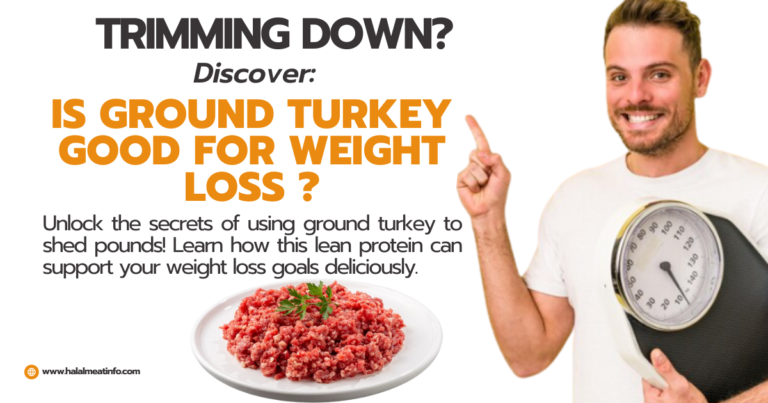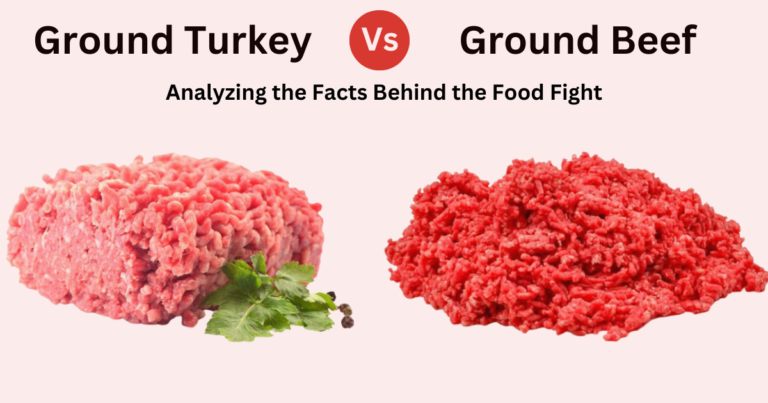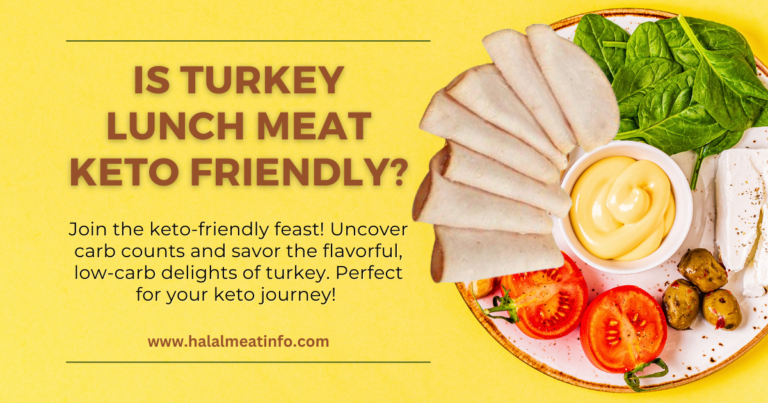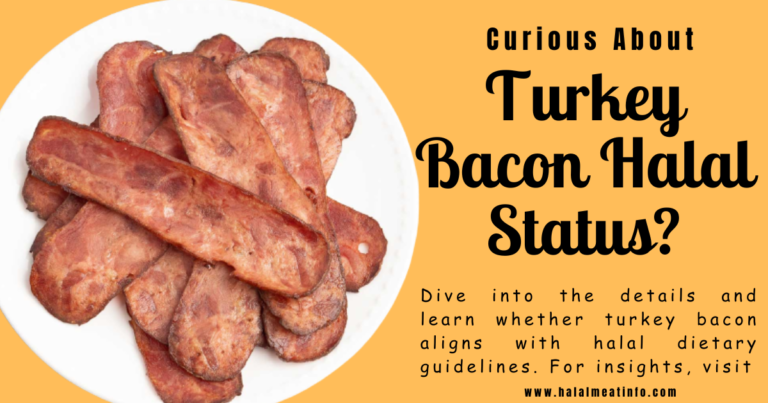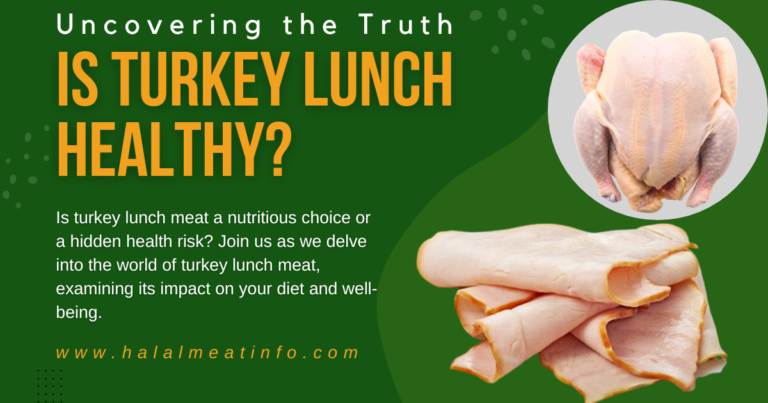Is Turkey Halal in USA?
The topic of halal food has gained increasing attention in recent years, with more people becoming conscious about what they consume and the religious implications behind it. One question that often arises is whether or not turkey, a popular type of poultry meat, is considered halal in the United States.
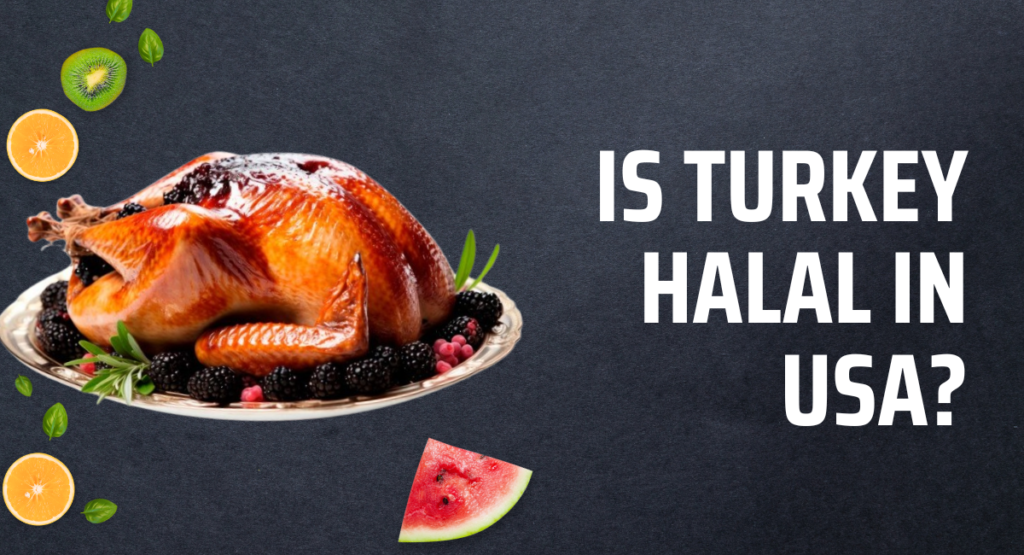
Definition of Halal
Halal, an Arabic term for “permissible,” refers to food that aligns with Islamic law, as defined in the Quran. The opposite, haram, signifies “forbidden.” For meat to be certified as halal, the animal must be treated with respect and killed in a specific manner that ensures minimal suffering.
Halal food is pivotal in Islamic dietary laws, representing not just a dietary requirement but also an expression of faith. It is a way for Muslims to maintain their spiritual cleanliness, as consuming haram food is believed to be sinful. Therefore, the issue of whether turkey is considered halal in the USA is of paramount importance to many Muslim individuals and communities.
Introduction to Turkey
Turkey is a large poultry bird native to North America, and it has become a significant fixture in American culinary traditions. People especially recognize turkey as the centerpiece of Thanksgiving meals and enjoy it in other dishes throughout the year. The high-protein, low-fat content and the subtle, versatile flavor of turkey meat makes it suitable for numerous cooking techniques and seasonings. Turkey, from a nutritional perspective, is abundant in vital nutrients like B vitamins, selenium, and zinc. However, when considering the halal status of turkey in the United States, it’s crucial to delve into the specifics of how the bird is raised, slaughtered, and prepared.
Is Turkey Halal in Islam?
Yes, turkey is halal in Islam provided it is slaughtered according to Islamic dietary laws.A Muslim must perform the act of slaughtering a healthy animal according to these laws. By saying “Bismillah Allahu Akbar,” they must invoke the name of Allah at the time of slaughtering. They must drain the blood from the veins and ensure the bird was not dead prior to slaughter. Meeting these conditions qualifies turkey, and other poultry, as halal in Islam. However, it’s always best to seek out turkeys that are certified halal, especially when residing in countries where Islamic dietary laws are not the norm. This ensures the turkey has been handled and slaughtered according to the stringent guidelines and requirements of halal.
Why is Turkey Bird Halal?
- Cloven Hooves and Chewing Cud: Turkeys meet the criteria outlined in Islamic dietary laws, having cloven hooves and chewing cud, making them permissible for consumption.
- Halal Slaughter Method: When slaughtered following Islamic guidelines, where the name of Allah is invoked and the blood is properly drained, turkey becomes halal.
- Absence of Forbidden Ingredients: Turkeys do not inherently contain any forbidden (haram) elements or ingredients, making them suitable for consumption by Muslims.
- Adherence to Islamic Dietary Laws: Turkeys, when raised and processed in accordance with Islamic dietary laws, align with the principles of halal, ensuring that they are permissible for Muslims to eat.
- Nutritional Benefits: The nutritional value of turkey, being a good source of protein and various essential nutrients, makes it a suitable and healthy choice within the bounds of halal dietary guidelines.
Opinion of Renowned Scholars on the Halal Status of Turkey
Different scholars have different interpretations of Islamic laws and some maintain stricter views than others. However, a consensus exists among many that turkey can be considered halal:
- Sheikh Muhammad Taqi Usmani: A highly respected Hanafi jurist, Sheikh Muhammad Taqi Usmani states that all birds except for birds of prey (with talons) are considered halal. This viewpoint makes Turkey permissible.
- Sheikh Yusuf Al Qaradawi: A well-known scholar in the Muslim world, Sheikh Yusuf Al Qaradawi, also considers turkey halal given that it is not a bird of prey and is slaughtered according to Islamic laws.
- Grand Mufti Ali Gomaa: The former Grand Mufti of Egypt, Ali Gomaa suggests that as long as the food is not clearly defined as haram in the Quran or Hadith, it can be considered halal. As turkey is not classified as haram, it falls under the category of halal according to Gomaa’s interpretation.
What is Halal Turkey? – Scholar Viewpoint
Scholar viewpoints play a significant role in determining the halal status of foods. Many scholars and Islamic authorities have confirmed that turkey is halal if it is slaughtered in accordance with Islamic dietary laws.
Is Turkey Halal in Sunni Islam?
According to Sunni scholars, there is no restriction placed on consuming turkey. Therefore, it is considered halal under Sunni Islamic dietary laws. This comes from the belief that anything not explicitly forbidden in the Quran is permissible to eat.
Is Turkey in Shia Islam?
Similarly, according to Shia scholars, there are no specific restrictions on consuming turkey. As long as it meets the general guidelines for halal meat, such as being slaughtered according to Islamic guidelines, it is considered permissible to consume in Shia Islam.
Is Turkey Islamqa?
The website IslamQA, which provides answers to frequently asked questions related to Islam and Islamic jurisprudence, states that turkey is halal for Muslims to consume. It also advises checking the source and method of slaughter when purchasing turkey to ensure it aligns with Islamic dietary laws.
Is Turkey Halal in Canada?
In Canada, similar principles apply with regard to the halal status of Turkey. As long as the turkey adheres to Islamic dietary laws during slaughter, it is deemed halal. The Canadian Food Inspection Agency (CFIA) oversees the certification of halal products in the country, ensuring that the slaughtering process aligns with Islamic Shari’ah law. Critical to note is the turkey’s health during slaughter, performed by a Muslim invoking Allah’s name in the process. To comply with the halal guidelines, one must fully drain the bird’s blood, and the bird must be alive at the time of slaughter. If these conditions are satisfied, Canada deems turkey as halal. Nonetheless, it is recommended for Muslims to eat only certified halal turkeys to guarantee that the treatment and slaughter of the bird align with halal guidelines.
Is Turkey Halal in the USA?
In the USA, halal certification is available and is often indicated on the packaging of the turkey. This certification confirms that the turkey was raised and slaughtered according to the standards set forth by Islamic law. However, consumers need to recognize that not all turkeys sold in the USA are halal.
Turkey Production in the USA
In the United States, turkey production is a substantial industry. Turkeys are typically raised on commercial farms, where they spend their lives in large, open-air buildings known as grow-out houses. These houses are designed to protect the turkeys from adverse weather and predators while providing a controlled environment that promotes growth. The turkeys are typically given a diet of grain-based feed that may include corn and soybeans, along with vitamins and minerals to support their health.
As for the slaughtering process, it is heavily regulated by the United States Department of Agriculture (USDA). The USDA requires that all birds be slaughtered in a humane manner, and this includes turkeys destined for halal consumption. As such, the slaughtering process for turkeys in the USA aligns with the principles of Islamic dietary laws regarding animal welfare.
Alignment of US-Turkey Production with Halal Requirements
The practices in the US turkey industry offer both alignments and conflicts with halal requirements. On one hand, the slaughtering process in commercial turkey production aligns with Islamic dietary laws regarding animal welfare. Commercial farming practices often conflict with the ethical and humane treatment of animals. These principles are emphasized in Islam. For this reason, many Muslims prefer alternatives. They often seek out organic or free-range turkeys. These birds are typically sourced from local halal butchers or farmers. The farmers ensure their birds are raised according to the principles of Islamic ethics.
Halal Turkey Availability in the USA
In the United States, there is an increasing availability of Halal turkey, catering to the demands of the growing Muslim population. Several brands have started offering halal-certified turkey, especially during the holiday season.
Brands offering Halal Turkey in the USA
Numerous brands are stepping up to meet the demand for halal turkey. Notable halal-certified turkey providers include:
- Saffron Road: It offering a variety of halal-certified products, including frozen turkey. Their turkeys are raised humanely on family farms and are never given antibiotics.
- Crescent Foods: Crescent Foods is well-known for its variety of halal poultry products, turkey included. They emphasize sustainable and ethical farming practices.
- Midamar: Midamar provides a wide array of halal-certified products. Their turkeys are hand-slaughtered, prepared, and seasoned according to halal standards.
Supermarkets and Stores where Halal Turkey is Available
Muslim-friendly turkey availability is on the rise. Mainstream supermarkets and dedicated halal grocery stores across the United States are steadily increasing their offerings. Some of these include:
- Whole Foods Market: Whole Foods Market carries a selection of halal-certified products, including turkey, particularly during the holiday seasons.
- Walmart: Walmart offers Muslim-friendly turkey in selected locations, often in areas with a high Muslim population.
- Local Halal Butchers: Local halal butchers and specialty stores often stock Muslim-friendly turkey, especially during festive seasons. Always advisable to check with your local halal butcher for availability.
It’s important to note that availability may vary by location and season. To ensure the availability of Muslim-friendly turkey, it’s advisable to call ahead. Alternatively, you can check online to confirm its presence in your local supermarket or store.
For more comprehensive insights on the health implications of consuming Halal turkey meat, feel free to visit our previous article, “Is Turkey Lunch Meat Healthy?
Challenges in Ensuring Halal Turkey
Despite the increasing availability of Muslim-friendly turkey in the USA, several challenges remain. These can hinder Muslim consumers from reliably sourcing Halal turkey.
Mislabeling and False Halal Certification Issues
One of the primary issues is the potential for mislabeling and false Halal certification. This is when products are incorrectly labeled as Halal, either through error or deliberate deceit. This can be problematic as it misleads consumers who rely on these labels to align their consumption with their religious beliefs. The issue calls for stricter regulation and monitoring of Halal certification agencies and more transparency in the certification process.
Difficulties in Tracking Halal Turkey due to Extensive Supply Chain
Another challenge lies in the extensive supply chain of turkey production. From the farm to the dining table, turkey passes through multiple stages, including raising, slaughtering, processing, packaging, and distribution. Additionally, Each step must adhere to Halal standards to ensure the end product is truly Halal. The supply chain can be intricate and lack transparency. This poses challenges for consumers. Specifically, it can be difficult to verify compliance with Halal requirements at all production stages. Efforts to improve traceability in Muslim-friendly turkey supply chains are necessary to address this issue.
Tips on How to Buy Halal Turkey
- Check for Halal Certification: Always look for the Halal certification label on the packaging. A duly certified Muslim-friendly turkey ensures that the bird has been raised, slaughtered, and processed according to Islamic law.
- Buy from Trusted Brands: Opt for reputable brands known for their commitment to Halal practices. Brands such as Saffron Road, Crescent Foods, and Midamar have garnered trust in the Halal market.
- Shop at Halal Grocery Stores: If possible, buy your turkey from a Halal grocery store or a store that carries a significant variety of Halal products. These stores are likely to have direct relationships with Halal-certified suppliers.
- Ask about the Slaughtering Process: If you’re uncertain, don’t hesitate to ask about the slaughtering process. It must be slaughtered by a Muslim individual in a specific manner that adheres to Islamic dietary laws.
- Understand the Brand’s Ethical Practices: Some Muslims prefer to buy from brands that align with Islamic ethics beyond just Halal certification, such as those prioritizing animal welfare and sustainable farming practices.
- Pre-order During Holidays: During festive seasons like Thanksgiving and Eid, consider pre-ordering your Halal turkey in advance to ensure availability.
- Be Aware of False Certifications: Be aware that not all products labeled as Halal meet the necessary requirements. If in doubt, research the certification agency whose logo appears on the package.
FAQ’s
Saffron Road, Crescent Foods, and Midamar are notable brands offering Muslim-friendly turkey in the USA.
It can be found at mainstream supermarkets like Whole Foods Market and Walmart, as well as local Halal butchers and specialty stores.
Mislabeling is a major issue in the Halal industry. Additionally, false Halal certifications also pose a significant challenge. The complexity of tracking the Halal supply chain further exacerbates these difficulties.
Firstly, checking for Halal certification is a crucial step when purchasing food items. Subsequently, it’s important to stick to trusted brands and even consider doing your shopping at dedicated Halal grocery stores.
Not all products labeled as Halal meet the necessary requirements. If in doubt, research the certification agency whose logo appears on the package.
Conclusion
In conclusion, the demand for Halal turkey is escalating across the USA. As a result, consumers are urged to exercise caution and vigilance with their purchases. Crucial steps to consider include actively investigating Halal certifications and gaining a solid understanding of a brand’s ethical practices. Each of these actions holds considerable weight in ensuring adherence to Islamic dietary laws. Despite these guidelines, however, difficulties still remain in verifying the authenticity of Halal labels. However, concerted efforts from regulatory bodies, Halal certification agencies, and consumers can drive transparency and reliability in the Halal turkey market. Increased consumer awareness and promotion of ethical and transparent practices are vital. Such measures among suppliers and retailers safeguard the integrity of Halal products in the market.


